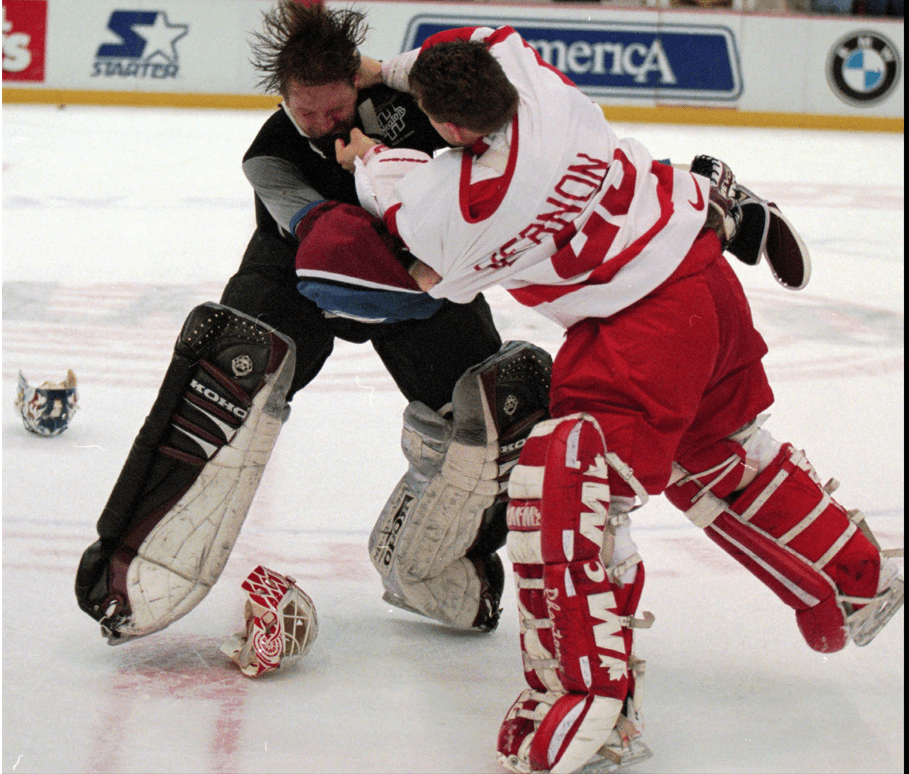Colorado Avalanche
Frei: What it was like covering Avalanche-Red Wings “Blood Feud” game 25 years ago today

At the 25th anniversary of the infamous March 26, 1997, Avalanche-Red Wings game in Detroit, here’s my narrative of what it was like to be there and to cover the bizarre proceedings that night — plus what led up to them. This excerpt from the “Avalanche Glory Days” chapter in my book Playing Piano in a Brothel picks up following the Avs’ 1996 Stanley Cup championship.
The next season became famous for intensifying the rivalry that developed in the 1996 Western Conference finals and was heightened by Claude Lemieux’s hit on Kris Draper. As ESPN and other television networks played and replayed the same videos over the years, they almost became clichés.
But I’d be remiss if I didn’t at least make mention of the most toxic game in the rivalry—the March 26, 1997, meeting in Joe Louis Arena. Technically, colleague and friend Adrian Dater was the Avalanche beat writer and I was the NHL writer at the time. We shared the travel, though, and I took this trip, to Philadelphia, Hartford and Detroit. In subsequent years, we joked that if all hell was going to break loose, it was going to break loose on one of the trips I was on. It was the Avalanche’s second appearance of the season in Detroit, but the first game, in November, was relatively calm—primarily because Lemieux was hurt and didn’t play. Detroit’s all-sports radio station had been selling “Screw Lemieux” T-shirts and treating the return as a monumental event.
The morning of the game, the Detroit News added to the hysteria by running a mock Lemieux “Wanted” poster as a graphic accompaniment to a column castigating the Avalanche winger. In the column, Darren McCarty was quoted as saying, “I was taught the best time to get revenge is when they’re not expecting it. He’s [Lemieux] played long enough, he knows eventually something will happen. The trump card is, he doesn’t know when.”
The “when” was late in the first period. It got started in unlikely fashion—when Peter Forsberg and the Wings’ Igor Larionov, the veteran Russian, got in a skirmish along the boards. It was mere jostling, but it provided McCarty an excuse to go after Lemieux and start throwing punches as the officials were preoccupied with the Europeans. Lemieux “turtled” and didn’t fight back, and McCarty kept throwing punches. Other fights broke out. It got out of hand, but the NHL had progressed from the Broad Street Bullies days because the benches didn’t empty. The fines and suspensions would have been prohibitive, and everyone understood that.
As Lemieux covered up, Patrick Roy skated out of the crease to come to Lemieux’s aid, but he was intercepted by—and collided with—Detroit winger Brendan Shanahan, and Roy suffered a cut when he hit his head on the ice. Then he got in a fight with Detroit veteran goalie Mike Vernon, who had answered the call by coming out of his crease to even the numbers.
Years later, when I visited Roy in retirement, when he was part owner and general manager of major junior’s Quebec Remparts, Roy had a huge poster of himself with blood dripping down his face, being escorted off the ice by a linesman, displayed in the equipment room. It was supposed to be inspiration for his young players, reminding them that he had been a warrior.
That night, he quickly took some butterfly stitches from trainer Pat Karns and then returned to his crease.
Referee Paul Devorski fouled it up, giving McCarty only a double minor.
I’m an advocate of discretionary officiating and of leagues empowering its officials to make what amounts to “power of God” decisions in situations such as this. Heading off further trouble, Devorski should have given McCarty a game misconduct, regardless of how much he did or didn’t see, and announced that if anyone so much as coughed the rest of the game, they’d get tossed, too.
And, yes, he should have found a way to toss Lemieux, too, although all he did was take punches then return to the game in the second period. That first period melee was just the start of things, and the upshot was that the Red Wings, trailing 5–3 with eleven minutes remaining in regulation, ended up winning 6–5 in overtime—on a McCarty goal.
In the visiting dressing room, Lemieux didn’t speak, but it was almost comical to see Mike Keane positioned at his stall, obviously ready to get some things off his chest. To wave after wave of reporters, he repeated the same speech. One of his points was that Lemieux had played against the Red Wings in Denver ten days earlier, but the Red Wings hadn’t tried to get retribution there. “I think that team has no heart,” Keane said. “Detroit had the opportunity to do that in our building, but they didn’t. They come home and played it rough. That’s fine. I think they showed their true colors tonight. Everyone’s gutless on that team and I’d love to see them in the playoffs.”
I walked down the hall and found Pierre Lacroix in the visiting bench area pacing with his hands in his pockets. He told me that McCarty had “sucker-punched” Lemieux and also delivered a knee to the head. He argued that some of McCarty’s pre-game comments about retribution were evidence of premeditation and that he not only deserved to be tossed from the game with a gross misconduct, but that he deserved a suspension.
Next, I headed to the Detroit dressing room. McCarty took so long to emerge and talk with the media that I caught his entire session. I actually like McCarty, but his comments, while candid, were also disingenuous. If he was proud of what he did, he should have just said so. Instead, he strained credibility by saying he hadn’t targeted Lemieux.
“No, it just sort of happened,” McCarty said to those of us crowded around him for comment. “Guys just square off . You gotta get a partner, eh? He was the closest one to me. I didn’t really realize it was him.”
Was it a sucker punch?
“No, because he was looking at me,” McCarty said. “I didn’t hit him from behind. It was face to face.”
McCarty scoffed when the subject of a possible suspension came up. “I don’t see why,” he said. “It was boys having fun out there, that’s what it is. They started it, anyway.”
Told that the Avs were talking about the Red Wings lacking heart, McCarty said, “They can say whatever they want. They’re the Stanley Cup champions and they can say whatever they want until we dethrone them or somebody dethrones them.”
He delivered a filibuster about why fighting is the ultimate accountability.
“Hockey’s an emotional game,” he said. “We’re not stupid in here. We’re not going out of our way. I don’t know what you expect. You want real retribution right away. . . . Crack a stick across the face, is that it? No. You might knock his eye out. No matter how bad it was to Kris [Draper], he’s all right now.
“If you believe in the Bible, it’s an eye for an eye. Fist on fist. That’s another reason you have to keep that in the game. . . . In this game, you have a long memory. We’ve played this game since we were six or seven years old, and you remember things kids did to you when you were eight, and you don’t get them back until they’re twelve. You have a long memory.”
A Red Wings official called McCarty away from his locker, but he did have one more comment when he was asked about getting the winning goal.
“That’s the best thing,” he said. “We won the game.”
Two months later, the Red Wings got revenge for the previous year’s loss to the Avalanche in the playoffs, beating the defending champions in six games in the Western Conference finals.
After the Wings’ clinching 3–1 victory in Game 6 in Joe Louis Arena, even the civilized tradition of shaking hands after the conclusion of a playoff series was a casualty of the animosity. Dino Ciccarelli wasn’t with the Wings any longer, so he didn’t have to worry about shaking anyone’s “freakin’” hand, but there were other decisions made.
Traditionally, as opponents, you might have carved each other up on the ice, but you walk through the reception line, grit the teeth you have left, and even with blood dripping down your face and hatred in your heart, you shake hands. But on that night in 1997, Draper wouldn’t shake hands with Lemieux. Lemieux stuck out his hand, Draper conceded, but Draper said he passed because Lemieux wasn’t looking him in the eye.
It was catching. Seconds later, Lemieux refused to shake hands with McCarty.
“I was gonna, and he didn’t want to,” McCarty said. “So I think it just shows his immaturity. I was brought up better than that, so I didn’t go out of my way. That’s all I have to say about that.”
EDITOR’S NOTE: Also see my own story on this, with fresh insights from guys like Marc Crawford and Scotty Bowman, along with an excerpt from my 2006 book, “Blood Feud” – Dater
Terry Frei (terry@terryfrei.com, @tfrei) is a Denver-based author and journalist. He has been named a state’s sportswriter of the year seven times in peer voting — four times in Colorado and three times in Oregon. His seven books include the novels “Olympic Affair” and “The Witch’s Season.” Among his five non-fiction works are “Horns, Hogs, and Nixon Coming,” “Third Down and a War to Go,” “March 1939: Before the Madness,” and “’77: Denver, the Broncos, and a Coming of Age.” He also collaborated with Adrian Dater on “Save By Roy,” was a long-time vice president of the Professional Hockey Writers Association and has covered the hockey Rockies, Avalanche and the NHL at-large. His web site is www.terryfrei.com and his bio is available at www.terryfrei.com/bio.html
His Colorado Hockey Now column archive can be accessed here











